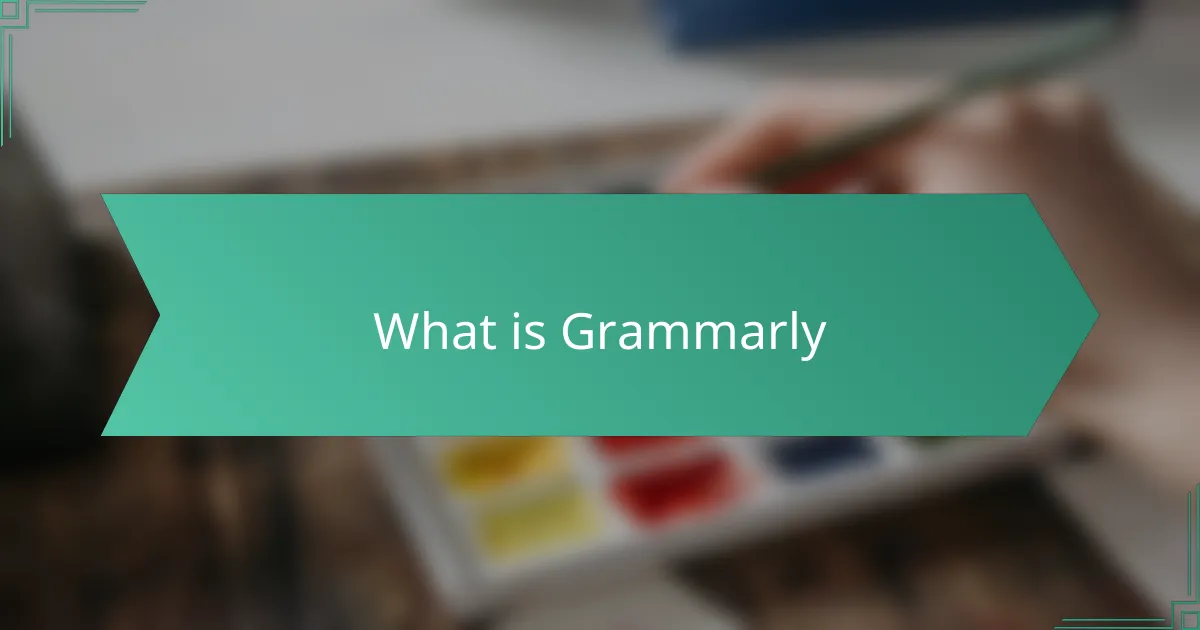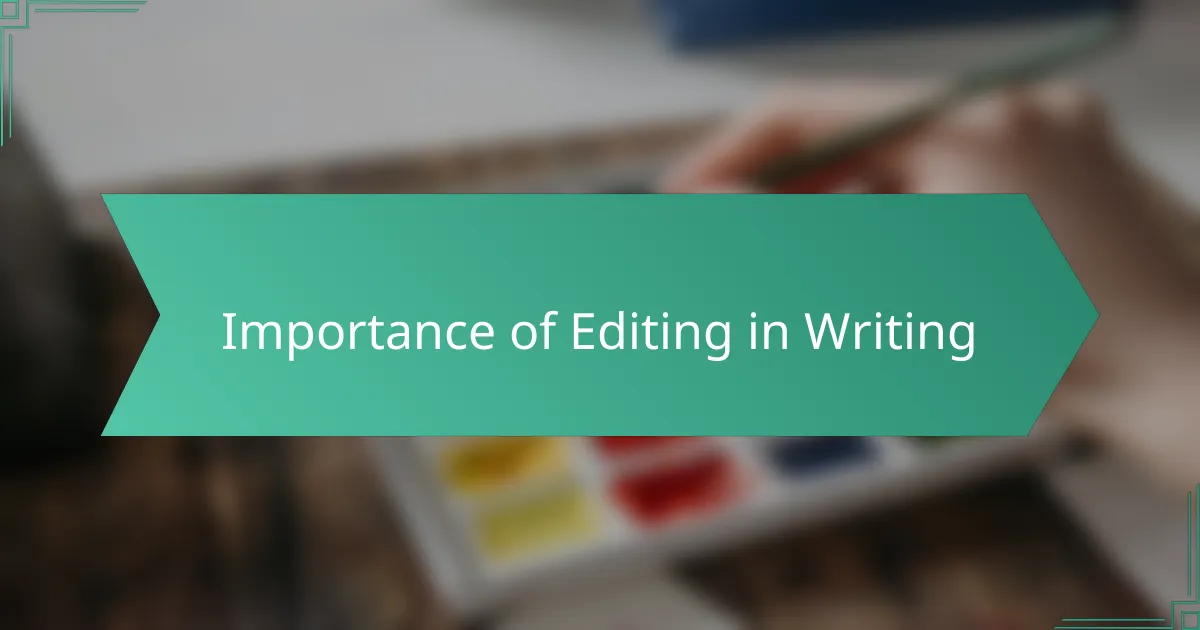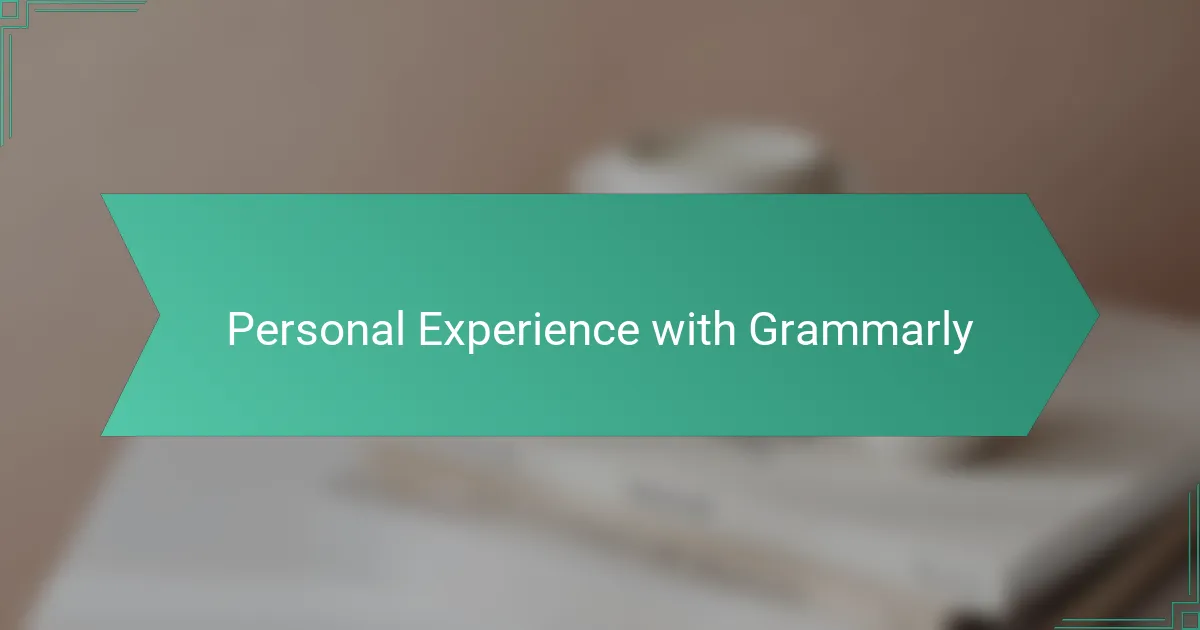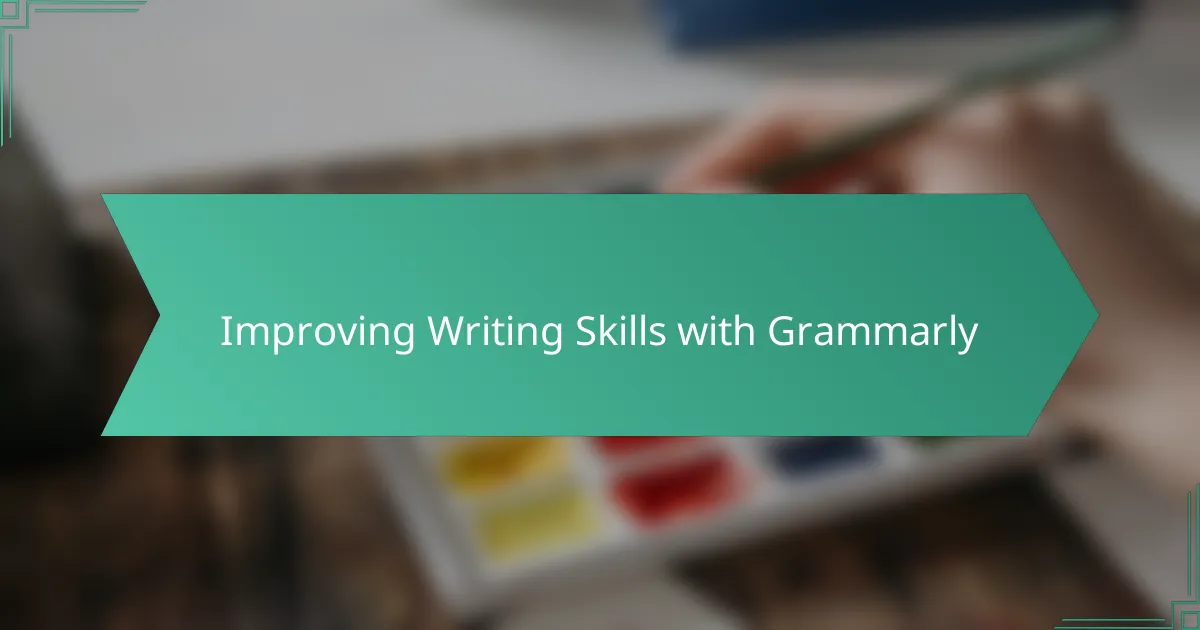Key takeaways
- Grammarly acts as a digital writing coach, providing real-time feedback on grammar, style, and tone, which enhances the clarity of writing.
- It significantly speeds up the editing process by catching small errors and offering suggestions, allowing writers to finalize drafts with confidence.
- Editing is key to transforming initial drafts into polished work; Grammarly facilitates this by helping identify habits and patterns in writing.
- Utilizing Grammarly within a writing community helps maintain a supportive environment, allowing writers to improve their submissions before sharing with peers.

What is Grammarly
Grammarly is an advanced writing tool designed to catch grammar mistakes, spelling errors, and style issues that often slip past my own eyes. I remember the first time I used it—it felt like having a patient editor right by my side, quietly suggesting improvements without judgment. Have you ever wished for that kind of instant feedback as you write?
What sets Grammarly apart for me is its ability to go beyond simple corrections; it offers clarity suggestions and even detects tone, which makes my writing more polished and approachable. Using it feels like having a writing coach who’s available 24/7, gently guiding me to express my ideas more clearly.
In essence, Grammarly serves as a digital partner in my writing journey, constantly helping me sharpen my skills. It’s more than just a tool—it’s a way to boost confidence when I’m unsure about how my words come across. Wouldn’t you want that extra reassurance every time you hit “send”?

Benefits of Grammarly for Writers
One of the biggest benefits I’ve found with Grammarly is how it catches those tiny mistakes that, believe me, I often miss after staring at my work for hours. It’s like having a second pair of sharp eyes that never get tired or distracted. Have you ever sent off a document only to spot an embarrassing typo moments later? Grammarly has saved me from that more times than I can count.
Another feature that really stands out is how Grammarly helps me refine my tone and clarity. Sometimes, I get so deep into my writing that I forget how it might sound to someone else. Grammarly nudges me to make my sentences clearer and friendlier, which always feels like a win when I want to connect better with readers in Portland’s creative community.
Finally, I appreciate how Grammarly speeds up my editing process without compromising quality. Instead of agonizing over every sentence, I get quick suggestions that boost my confidence to finalize drafts faster. It’s like having a trusty co-writer who’s always ready to help—something every writer, especially in a busy city like Portland, can truly appreciate.

Importance of Editing in Writing
Editing is where the magic really happens in writing. I’ve learned that no matter how inspired I feel during the first draft, polishing those words makes all the difference between good and great. Have you ever reread something you wrote weeks ago and wondered how you missed that awkward sentence? That’s exactly why editing is crucial.
When I skip or rush through editing, my work often feels clunky or unclear. Taking time to revise allows me to refine my ideas and strengthen my message. It’s a process that transforms raw thoughts into something meaningful that truly resonates with readers.
Sometimes editing can feel tedious, but I’ve found it’s also an opportunity for growth. Each correction teaches me more about my writing habits and how to improve. Isn’t that what every writer wants—to keep getting better with every word they put on the page?

Using Grammarly in Portland Writers Community
Using Grammarly within the Portland Writers Community has been a real game-changer for me. Sharing drafts with fellow writers often means multiple rounds of feedback, but Grammarly lets me catch many issues before I even post. Doesn’t that make group critique sessions feel more focused and productive?
I’ve noticed that fellow Portland writers who use Grammarly seem more confident about submitting their work to local journals or readings. Maybe it’s because the tool helps us speak in a clearer, more authentic voice—something that resonates in our tight-knit creative circle. Have you felt how much smoother workshops run when everyone’s polished their pieces beforehand?
What I find especially valuable is how Grammarly complements the supportive vibe of Portland’s community. It’s like a silent partner that respects each writer’s unique style while gently pointing out ways to enhance clarity. Don’t you think that balance between guidance and freedom is what nurtures real growth as a writer?

Personal Experience with Grammarly
Using Grammarly has truly changed how I approach editing my work. There was this one time I was rushing to meet a deadline, and Grammarly caught a clumsy sentence that completely altered the meaning—I honestly don’t know what I would’ve done without it. Have you ever felt that relief when a simple fix suddenly makes your writing shine?
What stands out to me most is how Grammarly picks up on nuances I often overlook, like tone or wordiness. It’s like having a writing buddy who gently nudges me toward clearer expression without sounding harsh or critical. Have you noticed how small tweaks can make a huge difference in how your message lands?
At first, I was a bit skeptical about relying on a tool, but now I find myself trusting Grammarly’s suggestions more and more. It’s reassuring to know I have that extra layer of support, especially when I’m feeling stuck or unsure. Doesn’t that kind of backup make the whole writing process less stressful?

Practical Tips for Grammarly Users
One practical tip I’ve found essential is to customize Grammarly’s settings to fit your own style and goals. Early on, I overlooked this and kept getting suggestions that didn’t feel right for my voice. Have you ever ignored a helpful tool because it felt like it was trying to rewrite you? Adjusting preferences helped me keep my authenticity while still benefiting from smart corrections.
Another thing I recommend is reviewing Grammarly’s explanations, not just accepting changes blindly. At first, I was tempted to click “accept” on everything to save time, but that short-circuited my learning. When I took a moment to understand why Grammarly flagged something, I caught recurring patterns in my writing to work on. Isn’t it satisfying to see your skills improve through small, informed edits?
Lastly, remember that Grammarly is a guide, not a grammar police officer. Sometimes, my work called for creative liberties, and Grammarly’s suggestions didn’t quite fit. I learned to trust my intuition, using the tool’s feedback as a checkpoint rather than a rulebook. Have you ever struggled between following rules and expressing your unique style? Balancing both can make your writing both polished and personal.

Improving Writing Skills with Grammarly
When I first started using Grammarly to improve my writing skills, I was surprised by how much more aware I became of my frequent mistakes. It’s like the tool gently highlights patterns I hadn’t noticed before, pushing me to be more mindful with each sentence. Have you ever realized you make the same errors repeatedly, only after someone points them out? That’s exactly what Grammarly helped me uncover.
What I find most valuable is how Grammarly doesn’t just correct me but teaches me why something needs fixing. Instead of just fixing a typo, it explains the rule or suggests a clearer phrasing, which has helped me grow as a writer. Over time, I noticed my drafts needed fewer corrections, and that kind of progress feels incredibly rewarding.
Sometimes, Grammarly’s suggestions prompt me to rethink how I express ideas altogether. This isn’t about making writing robotic; it’s about refining my voice to connect better with readers. Have you ever struggled to get your thoughts across simply and powerfully? Grammarly has become my secret weapon for turning rough drafts into more confident storytelling.